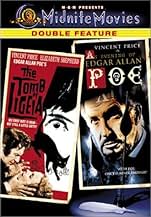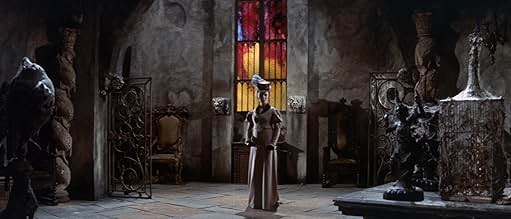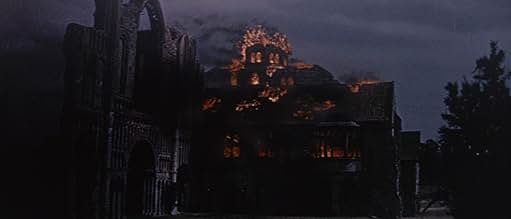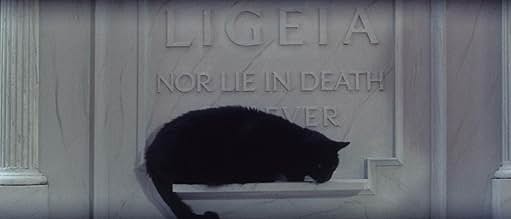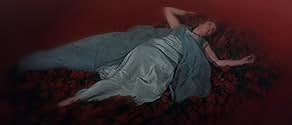IMDb RATING
6.4/10
7.3K
YOUR RATING
A man's obsession with his dead wife drives a wedge between him and his new bride.A man's obsession with his dead wife drives a wedge between him and his new bride.A man's obsession with his dead wife drives a wedge between him and his new bride.
- Director
- Writers
- Stars
Maxwell Craig
- Wedding Guest
- (uncredited)
Anthony Lang
- Wedding Guest
- (uncredited)
Del Watson
- Footman
- (uncredited)
Fred Wood
- Wedding Guest
- (uncredited)
- Director
- Writers
- All cast & crew
- Production, box office & more at IMDbPro
Featured reviews
There is an assumption among movie fans that the longer a movie series exists, the worse the later films will be. Although the films Roger Corman made of some of the stories of Edgar Allan Poe began well and continued with no obvious sense of decline, it is my opinion that the best was kept for last. The most overtly spectacular film in the series was 'The Masque of the Red Death' with its fine sense of colour and effective sense of homage to Ingmar Bergman's 'The Seventh Seal'. I have always enjoyed this film and in terms of a deliberate departure from the series norm, it is exceptional. However one enjoys any series for the familiar as well as the unusual, and in this respect 'The Tomb of Ligeia' is the most memorable for me in the way it builds upon and enhances what has gone on in previous films. The logical departure from the previous films which had been (very happily and effectively) studio-bound, was to move to location. Corman's choice of Castle Acre Priory in Norfolk, was an inspired one. An large amount of location filming was done there and this grounded the film in a realistic (yet unusual)setting. Gone were the fog machines and 'blasted heath' effects of 'House of Usher' and 'The Premature Burial'. Many critics have mentioned their disquiet at the absence of Barbara Steele, at that time undoubtedly the actress most associated with this type of picture. Wonderful though Miss Steele was in, say, the last thirty minutes of 'The Pit and the Pendulum', I feel that the presence of the English actress, Elizabeth Sheppard, adds to the sense of realisim, while taking little away from the shock effect of one actress playing both a good and an evil role. Roger Corman is on record as saying that he had to keep a written record as to when Rowena was herself and when she was Ligeia. All I can say that it is happily obvious on the screen when each side of the romantic coin is in evidence. I think that Elizabeth Sheppard's performance, grounded in reason, and when added to the inevitable polish that was being obtained by this stage in the series, showed a welcome extra sense of belief, to point out the advances and progression that had been made by this, the last film, in the series. Two scenes stand out : the entrapment of Rowena in the bell tower by the black cat (representing Ligeia.) I am also very impressed by Rowena's hynotism ; first to her own childhood and then to the persona of Ligeia. This film has not been available for viewing in the UK for many years. It is to be hoped that this situation will be reversed before long. I remember with affection the moment when great talents (from both sides of the 'pond') collaborated with great effcetiveness to come up with the ultimate 'Corman Classic'.
Very fine Poe adaptation. I had always reckoned Masque of the Red Death, from the same period to be far superior, but not so. Viewed again this is very well put together, especially the first half, which is really only setting the scene for the Poe tale to be told. Not quite as stylish as the aforementioned film, this is still, nevertheless, possessed of a very strong dream like quality and builds scarily as doors rattle, animals squawk and the inevitable black cat scrambles, leaps and screeches. Wonderful setting of Castle Acre Priory helps give the film greater authenticity and Corman mixes the Shepperton Studio interiors well with the beautiful Norfolk countryside and the marvellous grandiose priory remains. I don't know why the tomb of the title had to be so shining white and new looking but never mind, a really good Corman outing with excellent performances from Price and the leading lady Elizabeth Shepherd, who regrettably seems to have otherwise worked almost exclusively in television. She has real presence here in a double role successfully mixing the seductiveness of Lady Rowena and the satanic steel of Ligeia.
Of all the collaborations between director Roger Corman and sensuous, creepy actor Vincent Price, this is probably their best. There's the small cast of characters, mainly Ligeia, buried in a marble tomb in the grounds of a sinister old abbey, Rowena, a lady horserider looking for someone she can be 'drawn' to who is more interesting than her beau Christopher, and Verdon, Ligeia's bereaved husband, with his black shades and mood swings. There's also a cat. And this cat is really the true star of the film, watching, attacking, influencing.
The film benefits from its heavy use of locations, and makes it stand apart from the studio interiors of other adaptations. This is a decadent, decaying England with strange happenings and curses. It is a superb film, and lifts the Shepperton Poe adaptations to a new level.
The film benefits from its heavy use of locations, and makes it stand apart from the studio interiors of other adaptations. This is a decadent, decaying England with strange happenings and curses. It is a superb film, and lifts the Shepperton Poe adaptations to a new level.
"Ligeia" is one of my very favorite E.A. Poe stories, a masterpiece of suspense that doesn't reveal its secret until the very last word. Like a lot of Poe's stories, however, the transformation to the screen isn't always an easy one. A great deal of the action in the short story takes place in the narrator's head, and to make a feature length movie out of it there must be some added action and characters.
The screenwriter here, Robert Towne, would go on to bigger and better things and garner fame and awards while doing it. But this early script of his is a rather modest one. The action drags more and more as the film goes on and the sense of horror and tension dissipates rather than builds as the film progresses. Plus there's that annoying black cat (left over from another Poe story, perhaps?)
What points this movie does get are for style. Roger Corman wasn't a schlock director by any means; he had a great eye and and gave his films a distinctive look and feel. The cast is a very good one as well. Vincent Price does the usual fine job we expect from him and I liked actress Elizabeth Shepard as the Lady Rowena, Price's wife who succeeds Ligeia. I wasn't familiar with her before seeing this movie and I found her very watchable. But 'The Tomb of Ligeia' is hardly classic Poe or a memorable horror film. But fans of Corman and the Hammer Films type of productions may want to see it.
The screenwriter here, Robert Towne, would go on to bigger and better things and garner fame and awards while doing it. But this early script of his is a rather modest one. The action drags more and more as the film goes on and the sense of horror and tension dissipates rather than builds as the film progresses. Plus there's that annoying black cat (left over from another Poe story, perhaps?)
What points this movie does get are for style. Roger Corman wasn't a schlock director by any means; he had a great eye and and gave his films a distinctive look and feel. The cast is a very good one as well. Vincent Price does the usual fine job we expect from him and I liked actress Elizabeth Shepard as the Lady Rowena, Price's wife who succeeds Ligeia. I wasn't familiar with her before seeing this movie and I found her very watchable. But 'The Tomb of Ligeia' is hardly classic Poe or a memorable horror film. But fans of Corman and the Hammer Films type of productions may want to see it.
The genius of Edgar Allan Poe lies in his ability to create atmosphere and to draw us in with the power of his magically evocative language. As not a great deal happens in his stories and his characters are thinly drawn, film adaptors feel obliged to invent, expand, elaborate and embellish and this, the last of Roger Corman's versions of Poe, is certainly no exception. The liberties taken and the additions made by Robert Towne are too numerous to mention and include mesmerism and a hint of necrophilia!
The major change is that the marriage between Verden Fell and his second wife, Lady Rowena, is based upon love and not mutual loathing. Their characters have been fleshed out in the forms of Vincent Price as Fell and the lovely Elizabeth Shepherd as Rowena. Unfortunately Mr. Price's persona and air of mystery are unable to compensate for the fact that he is simply too long in the tooth for the role whilst Rowena's freedom of spirit and sensuality make her overpowering attraction to him faintly ludicrous. It is of course highly unlikely that the film would have received financial backing had Mr. Price not been in it.
As one has come to expect from Mr. Corman this film has excellent production values and art direction and is aided by a strong supporting cast.
Poe died in comparative poverty but his works have supplied a framework by which film-makers have enriched themselves. Mr. Corman especially has helped keep Poe's name alive but one must never lose sight of the original stories which remain, of their type, unparalleled.
The major change is that the marriage between Verden Fell and his second wife, Lady Rowena, is based upon love and not mutual loathing. Their characters have been fleshed out in the forms of Vincent Price as Fell and the lovely Elizabeth Shepherd as Rowena. Unfortunately Mr. Price's persona and air of mystery are unable to compensate for the fact that he is simply too long in the tooth for the role whilst Rowena's freedom of spirit and sensuality make her overpowering attraction to him faintly ludicrous. It is of course highly unlikely that the film would have received financial backing had Mr. Price not been in it.
As one has come to expect from Mr. Corman this film has excellent production values and art direction and is aided by a strong supporting cast.
Poe died in comparative poverty but his works have supplied a framework by which film-makers have enriched themselves. Mr. Corman especially has helped keep Poe's name alive but one must never lose sight of the original stories which remain, of their type, unparalleled.
Did you know
- TriviaShot on a 25 day schedule in the UK, a big difference to the 15 day schedule used in the US for the previous Roger Corman "Poe" movies. The director attributed the extra time to the British crew's obsession with taking "tea breaks."
- GoofsPosition of Ligeia's arms when lying in bed. When Rowena fall on her her arms are in a position like holding something. Few minutes later, when Verden take a look on the bed hidden by the black curtains, their arms are in other position.
- Quotes
Verden Fell: Christopher, not ten minutes ago I... I tried to kill a stray cat with a cabbage, and all but made love to the Lady Rowena. I succeeded is squashing the cabbage and badly frightening the lady. If only I could lay open my own brain as easily as I did that vegetable, what rot would be freed from its grey leaves?
- ConnectionsFeatured in Nightwatch Presents Edgar Allan Poe: The Tomb of Ligeia (1973)
Details
- Runtime
- 1h 22m(82 min)
- Color
- Aspect ratio
- 2.35 : 1
Contribute to this page
Suggest an edit or add missing content



